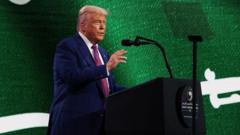In a bold reimagining of nuclear negotiations, Iran suggests involving regional players and U.S. investment, potentially reshaping the geopolitical landscape.
**Iranian Initiative for Nuclear Deal Entails Regional Cooperation with U.S. Involvement**

**Iranian Initiative for Nuclear Deal Entails Regional Cooperation with U.S. Involvement**
Iran unveils a strategic proposal for joint nuclear enrichment with Arab neighbors, aiming for a diplomatic breakthrough with the U.S.
Iran has introduced a proposal aimed at renewing nuclear negotiations with the United States, suggesting the establishment of a collaborative nuclear enrichment project that would involve several Arab nations and U.S. financial participation. This ambitious initiative, presented by Iranian Foreign Minister Abbas Araghchi during discussions with American envoy Steve Witkoff in Oman, seeks to maintain Iran's ability to produce civilian-grade nuclear fuel while ensuring rigorous monitoring.
The proposal has been highlighted in various Iranian media outlets, including the Revolutionary Guards-affiliated Farhikhtegan, igniting debate within Iran regarding its implications and the reactions it might elicit from both domestic and international stakeholders. While some view this as a step forward in negotiations, others question whether this approach constitutes a betrayal of national interests.
Responses from U.S. officials, including the State Department and the National Security Council, have yet to be disclosed, leaving the future of this potential deal uncertain. In addition to the inherent complexities surrounding such a venture, questions arise about how feasible collaboration among Iran, Saudi Arabia, and the United Arab Emirates would be, given the longstanding tensions that exist in the region.
Moreover, after an absence of diplomatic relations for 45 years, skepticism persists regarding the willingness of American companies to invest in Iran's nuclear infrastructure, given the potential economic and political repercussions of such an association. With these dynamics at play, it remains unclear how this proposal might evolve, as both nations navigate a historically charged relationship marked by suspicion and competition.
The proposal has been highlighted in various Iranian media outlets, including the Revolutionary Guards-affiliated Farhikhtegan, igniting debate within Iran regarding its implications and the reactions it might elicit from both domestic and international stakeholders. While some view this as a step forward in negotiations, others question whether this approach constitutes a betrayal of national interests.
Responses from U.S. officials, including the State Department and the National Security Council, have yet to be disclosed, leaving the future of this potential deal uncertain. In addition to the inherent complexities surrounding such a venture, questions arise about how feasible collaboration among Iran, Saudi Arabia, and the United Arab Emirates would be, given the longstanding tensions that exist in the region.
Moreover, after an absence of diplomatic relations for 45 years, skepticism persists regarding the willingness of American companies to invest in Iran's nuclear infrastructure, given the potential economic and political repercussions of such an association. With these dynamics at play, it remains unclear how this proposal might evolve, as both nations navigate a historically charged relationship marked by suspicion and competition.



















